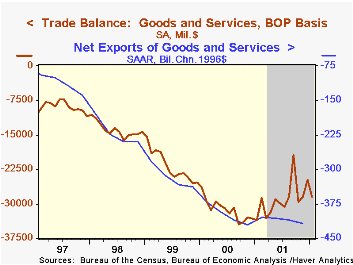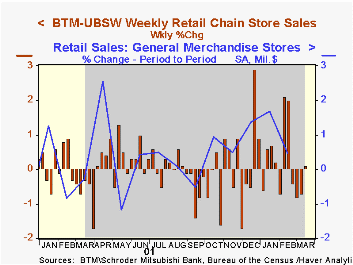 Global| Mar 19 2002
Global| Mar 19 2002January Trade Deficit Deepened
by:Tom Moeller
|in:Economy in Brief
Summary
The US foreign trade deficit rose more than expected in January. December's deficit was revised shallower from $25.3B reported last month. The trade deficit began 1Q02 slightly deeper than the 4Q average of $27.6B The strength of the [...]

The US foreign trade deficit rose more than expected in January. December's deficit was revised shallower from $25.3B reported last month. The trade deficit began 1Q02 slightly deeper than the 4Q average of $27.6B
The strength of the rise in imports, notably the 5.5% rise in capital goods and the 6.2% rise in nonauto consumer goods, is further indication that the US economy has improved.
Offsetting some of this strength is the continued weakness in exports. A 1.0% gain in capital goods and 2.9% gain in autos were offset by a 5.6% decline in nonauto consumer goods and a 10.1% decline in other goods exports.
Imports of industrial supplies and materials surged 4.4% as the value of petroleum imports rose 12%. The price per barrel of crude oil rose 5.2% to $16.31.
| Foreign Trade | Jan '02 | Dec '01 | Y/Y | 2001 | 2000 | 1999 |
|---|---|---|---|---|---|---|
| Trade Deficit | $28.5B | $24.7B | $33.5B(1/01) | $347.5B | $375.7B | $261.8B |
| Exports - Goods & Services | -0.1% | -0.1% | -13.3% | -5.7% | 11.3% | 2.6% |
| Imports - Goods & Services | 3.6% | -3.6% | -13.7% | -6.2% | 18.2% | 10.9% |
by Tom Moeller March 19, 2002

Chain store sales were about flat last week, up 0.1% following three consecutive weeks of moderate decline. So far in March store sales are roughly unchanged from the February average.
Inclement weather may have curtailed sales of spring clothing ahead of this year's relatively early Easter.
During the last ten years there has been a 20% correlation between the monthly percent change in chain store sales and the change in consumer confidence.
| BTM-UBSW (SA, 1977=100) | 3/16/02 | 3/09/02 | Y/Y | 2001 | 2000 | 1999 |
|---|---|---|---|---|---|---|
| Total Weekly Retail Chain Store Sales | 407.5 | 407.1 | 5.1% | 2.1% | 3.4% | 6.7% |
Tom Moeller
AuthorMore in Author Profile »Prior to joining Haver Analytics in 2000, Mr. Moeller worked as the Economist at Chancellor Capital Management from 1985 to 1999. There, he developed comprehensive economic forecasts and interpreted economic data for equity and fixed income portfolio managers. Also at Chancellor, Mr. Moeller worked as an equity analyst and was responsible for researching and rating companies in the economically sensitive automobile and housing industries for investment in Chancellor’s equity portfolio. Prior to joining Chancellor, Mr. Moeller was an Economist at Citibank from 1979 to 1984. He also analyzed pricing behavior in the metals industry for the Council on Wage and Price Stability in Washington, D.C. In 1999, Mr. Moeller received the award for most accurate forecast from the Forecasters' Club of New York. From 1990 to 1992 he was President of the New York Association for Business Economists. Mr. Moeller earned an M.B.A. in Finance from Fordham University, where he graduated in 1987. He holds a Bachelor of Arts in Economics from George Washington University.
More Economy in Brief
 Global| Feb 05 2026
Global| Feb 05 2026Charts of the Week: Balanced Policy, Resilient Data and AI Narratives
by:Andrew Cates






